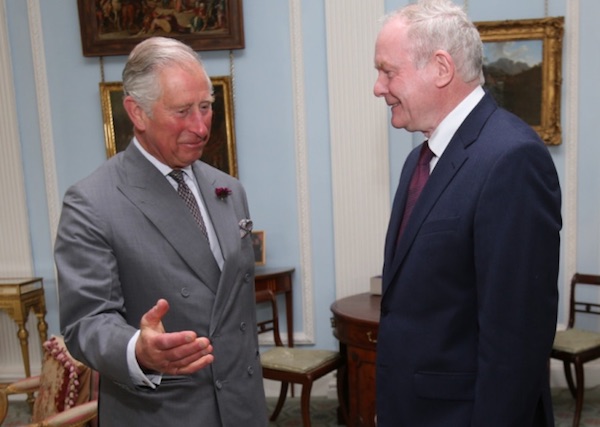
Sinn Fein’s Martin McGuinness has said he will visit the Somme battlefields of World War One as an act of reconciliation, to recognise human suffering and to reach out to his unionist neighbours in the north.
“World War One is an important part of Ireland’s multi-layered history during which tens of thousands Irish people lost their lives,” he said.
“If we are to build understanding and reconciliation on this island, we all need to recognise and accept the complexity of the historical events and differing political narratives that make us who we are as a community and as a people.
“It is in this spirit of reconciliation I will be visiting Flanders Fields next week to learn more about the Battle of Messines which took place in June 1917.
“I will also visit the Somme to mark the terrible loss of life on all sides in that battle one hundred years ago.”
Mr McGuinness added: “I am doing so in a sincere effort to recognise the human suffering and also the importance these events hold for the unionist section of our people.”
He will be accompanied on his visit to Flanders and the Somme by senior party colleagues in Sinn Fein including party vice president Mary Lou McDonald, a TD in the Dail.
Ms McDonald said Republicans were opposed to Imperial wars but that it was right to remember “in a respectful and inclusive manner” those who died.
“Republicans opposed the imperialist First World War and the subsequent slaughter which claimed the lives of millions,” she said.
“However, the loss of tens of thousands of Irish and Ulster Volunteers left a huge mark on our society.
“In this decade of anniversaries it is right to remember those who died in Flanders and at the Somme in a respectful and inclusive fashion.”
Earlier in the week, Mr McGuinness declined an invitation to attend a local memorial event for the Somme centenary, saying he does not want to be at the centre of controversy after unionists said they would protest his attendance.
DUP MP Jeffrey Donaldson welcomed his trip to Belgium and France, however. He said: “The timing of this visit is particularly significant, happening in the run up to the centenary. The events of that day and the service and sacrifice of those men are of utmost importance to the Protestant unionist and loyalist communities in Northern Ireland. It is extremely significant this is being recognised by Mr McGuinness and his colleagues.”
MEETING WITH PRINCE
Mr McGuinness revealed his intentions shortly after meeting with England’s Prince Charles in a 20-minute behind-closed-doors encounter at Hillsborough Castle during a visit to Ireland by the heir to the Windsor throne.
The prince also talked with DUP leader Arlene Foster in a separate encounters. The leaders were said to have updated him on the current political and economic situation in the north.
Charles and Camilla also visited Donegal in the 26 Counties in what was described as “the latest royal bid to solidify transformed relations with the Republic”. However, Charles, who remains the Commander-in-Chief of the infamous Parachute Regiment, was greeted by protests in Donegal town and Letterkenny.
One of those protesting was Mark McKinney from nearby Derry, where news of the latest visit angered families of the victims of the Bloody Sunday massacre.
“As the families still campaign for justice, let Charles Windsor explain to them why not one single Para Stormtrooper has been charged with these murders,” he wrote. “My own grandfather’s brother was murdered on the streets of Derry on Bloody Sunday and this government welcome this man here with open arms only half an hours drive from where those bodies were dumped on a hospital floor and left there for there loved ones to identify.”
About 100 protesters gathered outside the Letterkenny Institute of Technology, where the royals attended a reception in their honour.
Local independent councillor Ian McGarvey issued a statement criticising the protestors. “These people have to be confronted,” he said. “We should be creating history and passing on a legacy to our young people that they will appreciate.”
Another independent councillor, Michael Colm Mac Giolla Easbuig responded by asking if McGarvey is “questioning the democratic right of people to show opposition to the royal visit.”
“I would like Councillor McGarvey to clarify what he means by confronting people,” Councillor Mac Giolla Easbuig added. “Does he mean confronted by the gardai? Because that would be political policing in my view.”
![[Irish Republican News]](https://republican-news.org/graphics/title_gifs/rn.gif)
![[Irish Republican News]](https://republican-news.org/graphics/title_gifs/harp.gif)

